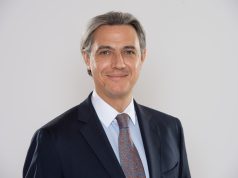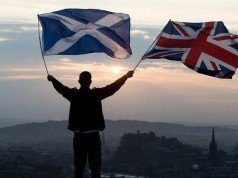Dying Of Too Little Debt, and Too Much Institutionalized Crime:
“Nobody Understands Debt” says Paul Krugman, and he demonstrates it in an excellent editorial. I am happy that he is finally getting black on white, what I wrote long ago. He does not put it as spectacularly as I have: at worst, debt becomes tax.
From Krugman’s description Dr. Merkel comes out as a complete fool (so it is not reassuring that she goes around the world that the Ukrainian Republic should not be sold lethal defense weapons: is she Putin’s agent?). Krugman concludes: “.if the euro does fail, here’s what should be written on its tombstone: “Died of a bad analogy.”
The world economy can die of other things too, such as massive corruption under the increasing weight of global plutocracy.
The presence of more than 30,000 known tax evaders in just one subsidiary of the British bank HSBC in Switzerland alone, between 2005 and 2007, has been revealed today. The total amount of tax evasion is 120 billion dollars. The accounts tied to politicians, royalty, designers, sports figures, corrupt businessmen, dictators, arms industry officials, drug traffickers, and high-end criminals.
The bank actively helped customers conceal the accounts from authorities. The bank also provided customers with cash under the form of bundles of old bank notes, in various currencies so they couldn’t be traced. Organized crime, also known as banking, is in charge of creating money. as debt. (97% of money is created by banks as credit, worldwide.)
The data was “illegally” downloaded by bank employee Herve’ Falciani, who later fled to France. Falciani told CBS’s 60 Minutes Sunday night that colleagues at the bank helped him with the data.
“Friends – let’s say partners – gave me these data,” Falciani says. “I’m not the only person in banking system that wants to raise alarm.”
60 Minutes made a biased report, insisting on Falciani wearing disguises, etc. Falciani was in jail in Spain (because of an Interpol warrant for his arrest launched by Switzerland, at the British bank’s prodding) for 5 months. During that time, Spanish authorities, fearing for his life, let him appear only under a heavy disguise. Falciani has now police protection in France.
Many heads of states are involved, including the King of Morocco, who had 8 million dollars on one account alone at HSBC Suisse. Moroccan law forbids foreign bank accounts. The King of Jordan had 41 million in one account.
Also several dozen major Arab plutocrats owned accounts obviously set-up to feed Bin Laden’s Al Qaeda. Plenty of accounts of HSBC could be traced to blood money.
The brother in law of the Tunisian dictator Ben Ali. Family members of the Syrian blood bathing dictator, Assad. A major woman politician from Burundi. Money from major drug traffickers, being laundered.
HSBC says that it did not know. That’s a lie: the bank called all the owners of the accounts exposed to politics “PEP” (“Politically Exposed People”.
Here is Krugman again: “Many economists, including Janet Yellen, view global economic troubles since 2008 largely as a story about “deleveraging” – a simultaneous attempt by debtors almost everywhere to reduce their liabilities. Why is deleveraging a problem? Because my spending is your income, and your spending is my income, so if everyone slashes spending at the same time, incomes go down around the world.
Or as Ms. Yellen put it in 2009, “Precautions that may be smart for individuals and firms – and indeed essential to return the economy to a normal state – nevertheless magnify the distress of the economy as a whole.”
The worst thing that can happen with national debt is that it does not get reimbursed. Then debt will act as a tax on those who had money to lend it. Not a tragedy. The failure of the Euro would be a tragedy, though.
So is sub-performing economic activity. It’s not a question of not buying enough cars, TV, pants and houses. It’s also a question of the educational system going down (so kudos to Obama for proposing to make college free. Although that just part of the problem).
What does debt do?
It augments the quantity of money on the economy while allowing greater economic activity. So, when demand is faltering, it makes demand higher than it otherwise would have been.
With all the infrastructure decaying, or proven insufficient, such as the educational system, one can only observe that more activity is needed.
A related problem is that the velocity of money has collapsed. Another indication of the insufficient economic activity.
Krugman again: “This was a prescription for slow-motion disaster. European debtors did, in fact, need to tighten their belts – but the austerity they were actually forced to impose was incredibly savage. Meanwhile, Germany and other core economies – which needed to spend more, to offset belt-tightening in the periphery – also tried to spend less. The result was to create an environment in which reducing debt ratios was impossible: Real growth slowed to a crawl, inflation fell to almost nothing and outright deflation has taken hold in the worst-hit nations.
Suffering voters put up with this policy disaster for a remarkably long time, believing in the promises of the elite that they would soon see their sacrifices rewarded. But as the pain went on and on, with no visible progress, radicalization was inevitable.”
Radicalization? It looks more like Enlightenment to me. Or then, one should go at the root of radical, which is root. Voters are starting to get to the root of the problem: they were manipulated by a class of greedsters who hold power.. And lied to get there.
Insufficient economic activity creates a plebs that does nothing but getting enough subsidies to get by, while a plutocracy rules above it. This is what happened to the Roman empire. Starting around 160 CE, taxes, especially on very rich estates became insufficient to support even the military.
Taxing the hyper rich then (as was done earlier under emperor Trajan) would have allowed to re-institute welfare for children, and make the military as strong as it was under Trajan (that, in turn brought peace and prosperity).
Are we not learning history?
Patrice Ayme





